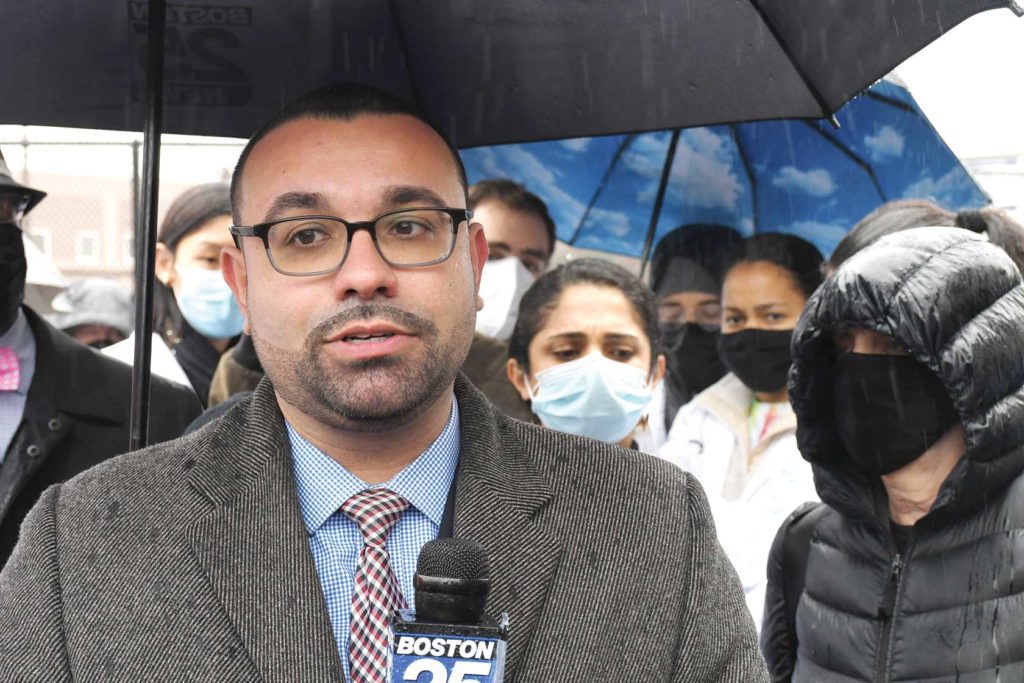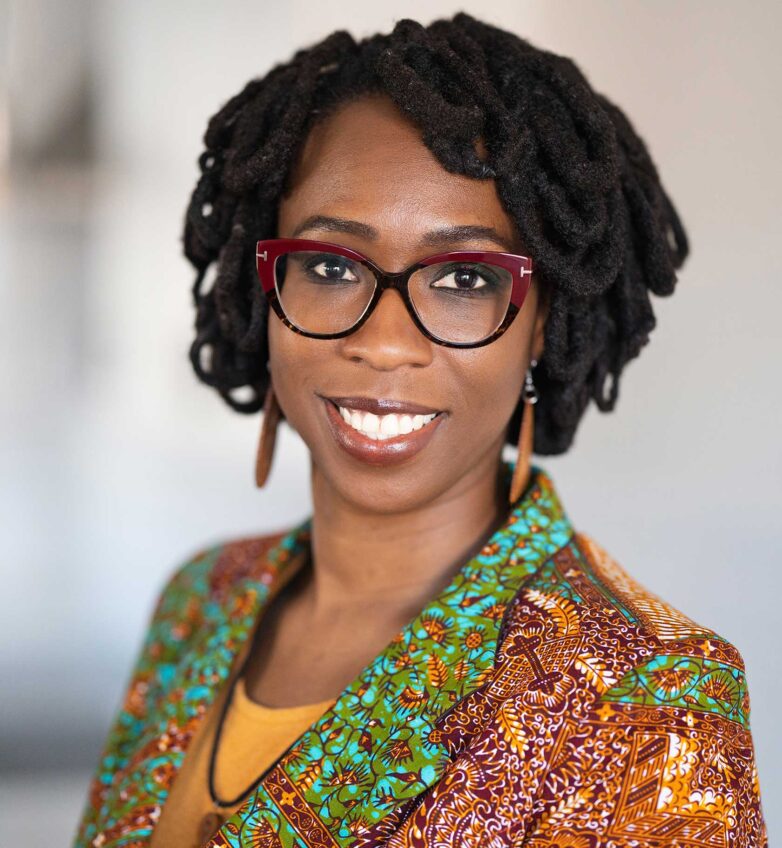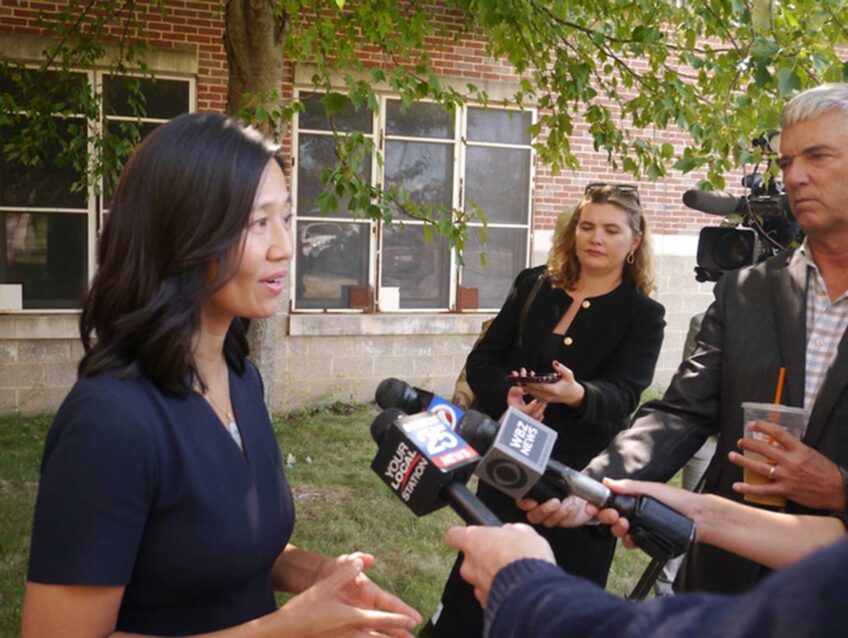Caution urged as city sweeps Mass & Cass
Advocates say city should provide housing before removing tents

Advocates and medical professionals gathered last Wednesday near the intersection of Massachusetts Avenue and Melnea Cass Boulevard to protest actions that would remove residents from the encampment forming near “Mass and Cass” and would, they said, criminalize homelessness and struggles with addiction and mental illness.
In recent weeks, acting Mayor Kim Janey instituted a city-wide ban on tents and temporary shelters. At the end of September, Suffolk County Sheriff Steve Tompkins floated a proposal to relocate those living in the encampment at Mass and Cass to a currently unused building in the Suffolk County House of Correction that once housed federal immigration detainees.
Under the acting mayor’s executive order, people living in tents were asked to remove their tents and go instead to a shelter. Monday, 16 tents were removed. Janey said at a press conference earlier this month that no one will be asked to move if there is not a shelter bed available for them and that enforcement would be used as a last resort if individuals refused to comply.
Like the advocates who spoke last Wednesday, Janey said at the Oct. 19 press conference that she did not seek to criminalize the individuals in the encampments.
Under Tompkins’ plan, no one would be involuntarily committed, but instead would be offered treatment instead of harsher sanctions, according to a WBUR report. In that same report, he too said he does not seek to criminalize people.
Yet advocates said they see these ultimatums offered by both Janey and Tompkins as false choices and worry that aspects of both these plans could cause more harm.

Sarah Wakeman, medical director at the Massachusetts General Hospital Substance Use Initiative. PHOTO: Avery Bleichfeld
“It is my medical opinion that displacing people, offering them ultimatums that include only congregate shelter, medically-supervised withdrawal or being funneled into a correctional setting, will worsen the public health crisis we are seeing by increasing the risk of overdose, the spread of HIV and fracturing linkages to needed health and human service providers,” said Sarah Wakeman, medical director at the Massachusetts General Hospital Substance Use Initiative.
Wakeman and others cited a statistic from a 2016 report put out by the state’s Department of Public Health that found that people experiencing opioid addiction who received involuntary treatment were 2.2 times more likely to die of opioid-related overdoses.
Advocates last Wednesday said that Boston’s shelters, which they described as warehouse-like settings, do not always provide environments that residents experiencing homelessness feel safe in.
Cassie Hurd, executive director of the Material Aid and Advocacy Program, said that her organization had spoken with people living in the encampment near Mass and Cass who had described factors such as lack of stability, inability to bring in belongings, lack of autonomy and mistreatment by staff as reasons they opted not to go to congregate care facilities.
“People are creating a community with the resources that have been made available to them,” Hurd said. “The city is citing trash, the city is citing feces, urine — people are not being resourced to meet their basic needs. People need bathrooms, people need regular trash cleanup. People need to be supported in the space they’re in. People need clean water, and they need to be able to care for each other.”
Advocates also called for more options for stable housing. Many of Boston’s shelters are only available on a night-by-night basis.
“We have spent more in policing this issue than it would have cost to provide housing to every individual on this side of town, and we know that,” City Councilor Ricardo Arroyo said. “The solution to this is not to cast judgement, it is not to put them in prison cells, it is not to do that to human beings. It is to actually house them, to provide them with the care that they need.”
One alternative offered by advocates at the press conference was to fall back on city-owned property to house residents in a way they hope would be more stable in the long-term. Similar proposals have been advanced by at-large City Councilor Michelle Wu in her mayoral platform and by then-candidate Andrea Campbell in the lead-up to the preliminary election in September.
Throughout the conference Wednesday, advocates returned to the message that the city and state should not take actions that they view as criminalizing homelessness and struggles with addiction and mental illness.
“If we are to actually do this in a way that is effective, in a way that meets the needs of these individuals, we have to do this with a public health focus,” said Arroyo, who serves as the chair of public health on the City Council. “Public health and incarceration do not go hand in hand. They are opposites, they are separate, they do not work together.”
State Rep. Ruth Balser, who represents the 12th Middlesex District, said she thinks there should be a caveat to the phrase “all options should be on the table.”
“I hear people say nothing is off the table. I’m here to say there’s one thing that’s got to be off the table, and that’s incarcerating people who are sick,” Balser said “If we found out there was a shortage of cardiac beds would we say, ‘Let’s send everyone with heart disease to a prison?’”




